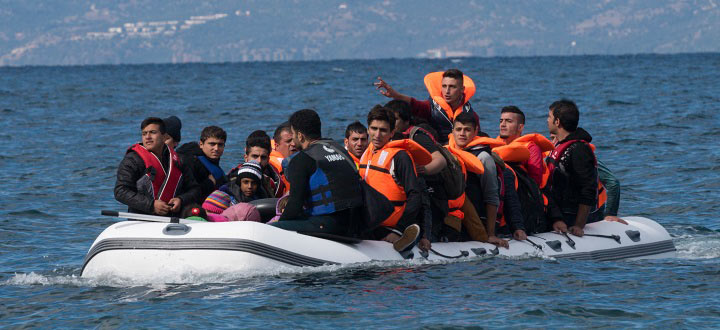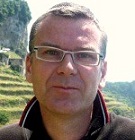Counting the human cost of the refugee crisis
-
Research
- Justice and Equality
Posted on 30 September 2015
As the refugee crisis unfolds across Europe, we launch major research projects highlighting the human stories behind those who make the dangerous Mediterranean crossings

We aim to give the people caught up in this crisis a voice”
In a local cemetery on the Greek island of Lesbos, rows of hastily-dug graves contain human remains, barely covered with earth and marked only with broken stones.
The graves are the final resting places of nameless men, women and children who died in the seas around Lesbos as they flee war and poverty in search of safer shores and a better life.
Sadly, many may never be identified. For many this is a a tragic unresolved loss, says Dr Simon Robins leader of a new research project which aims to improve official efforts to identify those who don’t survive the perilous sea crossings.
Waiting for news
“Without information about the fate of their loved ones, many mothers and wives, sons and daughters live between hope and despair, always waiting for news, but never receiving it,” says Dr Robins, a Research Fellow in our Centre for Applied Human Rights.
The Missing Migrants project aims to help EU states develop a more systematic approach to improving identification while highlighting the importance of informing families about the fate of their relatives. It draws on Dr Robin’s research expertise into the issue of missing people in post-conflict situations in countries such as Nepal and Timor-Leste.
The one-year project will include interviews with Syrian families who are left struggling with the psychological and emotional impact of loss and often with no information about the fate of their family members. When they do receive news that loved ones have died, red tape often prevents them learning more.
“In the very limited number of cases where families are informed of a death, they haven’t been able to attend the burial because they were told too late, or they are denied access to the country because they don’t have the necessary documentation,” says Dr Robins.
Some relatives have been deported or held in custody when they tried to visit Lesbos to identify loved ones.
Key evidence
“Key evidence such as SIM cards or photographs, details of distinguishing marks or clothing could be collected – but the problem is that at the moment, there are no procedures in place to collect or share this information,” says Dr Robins.
“The continuing failure to collect and record these details means more unidentified bodies in unmarked graves and another missed opportunity to ease the suffering of the families left behind.”
Another York researcher, Dr Simon Parker from our Department of Politics, is leading a one-year study examining the human cost of the Mediterranean emergency. His research aims to understand what drives people to tackle the dangerous journey to EU countries and what factors influence their destination choice.
Using marine satellite technology, the research team will identify and track rescued boats. They will interview migrants as they arrive in Italy, one of the busiest and most dangerous migrant sea routes. They will also interview officials and local support organisations across Sicily to find out how they are dealing with the large numbers of distressed people landing on their shores.
Documentary film
Many of the migrants’ stories will feature in a film, produced as part of the research project with the aim of creating lasting documentary evidence of the current crisis.
“Our study aims to understand some of the broader political and economic forces that are shaping the unprecedented levels of migration,” says Dr Parker. “We aim to provide objective academic analysis that will help to inform decisions about managing the response to the situation.
“Also, importantly, we aim to give the people caught up in this crisis a voice, which, through the medium of film, will act as a witness to one of Europe’s most challenging humanitarian emergencies.”
The University has announced funding of £500,000 over three years to help refugees escaping the worsening humanitarian crisis. The package includes scholarships for refugee students and offering scholar rescue status to refugee academics.
The text of this article is licensed under a Creative Commons Licence. You're free to republish it, as long as you link back to this page and credit us.

Dr Simon Parker
Research interests in urban studies and urban theory, socio-spatial informatics, the politics of asylum and immigration and comparative European politics

Dr Simon Robins
A humanitarian practitioner and researcher with an interest in transitional justice, humanitarian protection and human rights
Discover the details
Missing Migrants and Deaths at the EU’s Mediterranean Border: Humanitarian Needs and State Obligations is led by Dr Simon Robins in collaboration with researchers at Queen’s University Belfast and the International Organisation for Migration
Precarious Trajectories: Understanding the Human Cost of the Migrant Crisis in the Central Mediterranean is led by Dr Simon Parker in collaboration with Goldsmiths, University of London
The research is funded by the Economic and Social Research Council (ESRC) and co-funded by the Department for International Development (DFID)
Simon Robins is founder of a blog on the issue of missing persons The Missing Blog
The York Accord
Academics recently gathered at the University of York to agree details of the York Accord, an initiative to help higher education institutions caught up in conflict
Equal Access Fund
Find how you can support our Equal Access Fund for asylum seekers wanting to study at York
Explore more research

A research project needed to spot trees on historic ordnance survey maps, so colleagues in computer science found a solution.

We’re using gaming technology to ensure prospective teachers are fully prepared for their careers.

A low cost, high-accuracy device, could play a large part in the NHS's 'virtual wards'.
